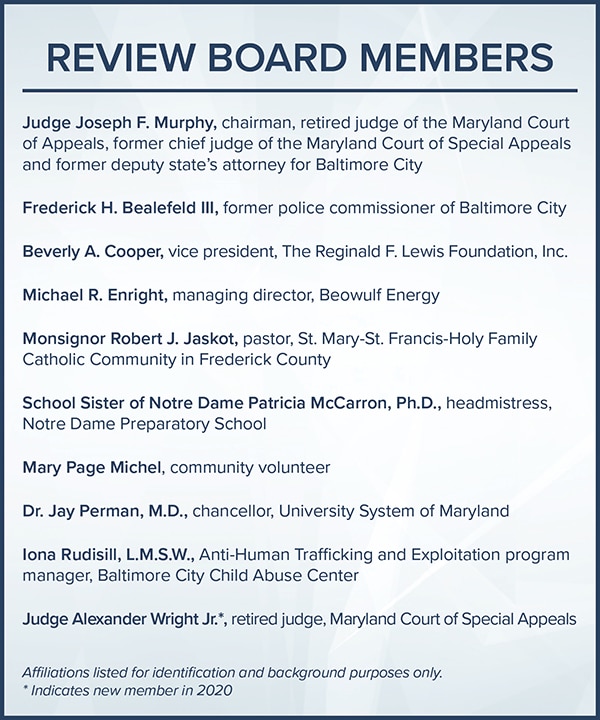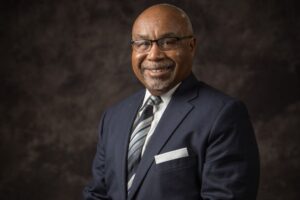As a retired judge for the Maryland Court of Special Appeals, Alexander Wright Jr. has tried cases and reviewed and written court opinions involving cases of abuse of children, and the cases stick with him.
“I can probably cite chapter and verse on every case that I’ve heard that touched on these issues,” the senior judge told the Catholic Review. “These issues are such that you are not able to forget them.”
For Wright, that experience over almost 21 years in the courts led to his acceptance of an invitation by Archbishop William E. Lori to join the Independent Review Board that assists the Archdiocese of Baltimore with child protection efforts.

Wright said he believes his experience – as a judge and someone who is interested in these issues – will benefit the board and the archdiocese.
The IRB reviews any matters of abuse of minors brought to the attention of the archdiocese’s Office of Child and Youth Protection, and reviews archdiocesan policy relating to such misconduct, recommending updates to those policies when appropriate.
The board issued a report on its activities in May detailing its work during the previous year; it was the third consecutive year such reports were issued.
After his retirement from the court of appeals, Wright was not necessarily looking to get involved in many more activities. He recently completed service on the board of the Franciscan Center. He joined the Archdiocesan Pastoral Council when it was formed in September 2019 and heard a brief presentation on the archdiocese’s work in the area of child protection at the council’s first meeting.
Wright, a longtime parishioner of New All Saints, Liberty Heights, said his wife, a Baptist and a retired schoolteacher, has long been interested in child protection issues and has been interested in how the Catholic Church has addressed them. She originally answered the call from the archbishop and after the couple discussed the invitation, she encouraged Wright to accept the role on the Review Board.
He will attend his first IRB meeting in September, and he has already met with Jerri Burkhardt, director of the Office of Child and Youth Protection for a two-hour orientation.
As he sees it, the Review Board’s work has two key parts. “The first part is what gets most of the news,” he said, addressing transgressions by priests, church employees and volunteers, and even bishops. The Archdiocese of Baltimore was the first in the country to establish a third-party reporting system for allegations of misconduct against bishops, which became a model for a nationwide policy.
Wright said it is his impression that the church is not getting the number and types of new cases or allegations as in the past, in part because of the measures the church has taken to weed out those types of seminarians, priests and employees.
He said he hopes the church is doing well to redress the transgressions of the past, and at the same time working to move forward.
Wright said the second part of the board’s work encompasses ongoing awareness of child abuse, child protection efforts and respecting boundaries. “I think the church is working hard in that regard to make sure that people who work with children are aware of where the boundaries are, making sure there are background checks, and making sure that people are aware of the particular guidelines,” he said.
In his time on the courts, he has seen things evolve, and he recently wrote an opinion in a case involving sexting. He said, for example, that he thinks TikTok, a short-form mobile video platform, could be problematic in that realm.
He said involvement in cases involving abuse of children “stays with you; you are not just an observer. You’re not just a bystander – you’re participating.”
Hearing such cases means that you have to do something about them in the hopes that such situations don’t happen in the future.
The OCYP’s Burkhardt praised Wright’s experience as a judge, noting that his criminal and civil background will be a plus. Wright replaces retired Judge Ellen Heller, who left the Review Board after having served 16 years.
Though she was disappointed that Heller was leaving the board, “I’m glad to know someone of his caliber is taking her place,” Burkhardt said.
She noted that Wright has served as a lawyer in private practice, as a government lawyer and a public defender, and then later serving as a well-respected judge.
“That kind of professional and life experience provide him with a point of view and expertise that will enable him to provide meaningful and independent review and advice to the archbishop on matters that come before the IRB,” Burkhardt said.
She said Wright has an amazing mind and asks good questions. “As is the case with someone with such experience, you can also see he’s willing to learn and ask questions.”
Most impressive is that with all the tragic sins and crimes Wright has seen from the bench, Burkhardt said his strong faith makes him a great asset.
He also seems to be independent, another quality important to the archdiocese and her office. “He’s used to dealing with serious matters. You can’t pull the wool over his eyes.”
During the day-to-day work in her office, she said she often thinks about the Review Board and how those experts will address a particular issue and what they will want to know. “If I can prepare for that, it makes me more effective,” she said.
The IRB usually meets four times a year, Burkhardt said, reviewing any new matters that come to the attention of the archdiocese, continuing to look at policies and ensuring that the archdiocese is doing its best to protect children and reach out to victim-survivors.
Wright, born and raised in Baltimore, in 1998 was the first African American to serve on the Baltimore County circuit court. Prior to that, he served as associate judge for the District Court of Maryland, Baltimore County, and was a member of the Maryland Commission on Criminal Sentencing Policy. He has also worked in private practice.
He served on the Maryland Court of Special Appeals from 2008 until his retirement last year at age 70, although he continues to hear some cases as a senior judge.
He and his wife Marcia have been married 49 years and have two sons.
In addition to the board of the Franciscan Center, he has served on the board of Good Shepherd Services and other nonprofits. He is a corporator for New All Saints Parish.
He said his life has four focus areas: family, the law, the bar association and the community. “I try to do my best in all those areas,” he said.
For more information visit www.archbalt.org/accountability
Email Christopher Gunty at editor@catholicreview.org.
Copyright © 2020 Catholic Review Media

